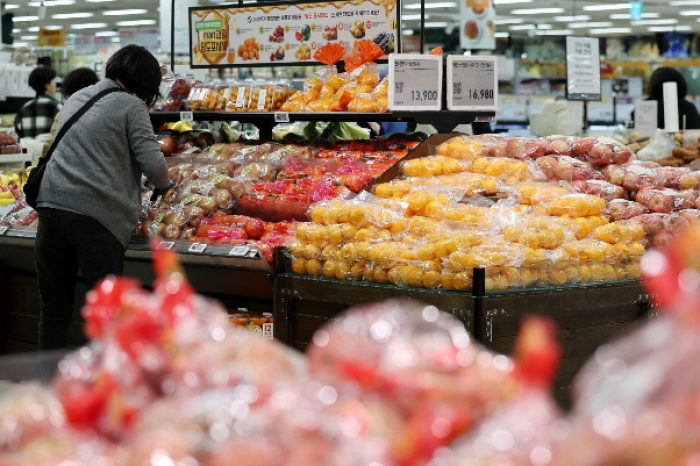Korea’s rate cut hope wanes with inflation above 3% in March
Higher fresh food and oil prices kept Asia’s No. 4 economy’s headline inflation above the central bank's 2% target
By Apr 02, 2024 (Gmt+09:00)
LG Chem to sell water filter business to Glenwood PE for $692 million


KT&G eyes overseas M&A after rejecting activist fund's offer


Kyobo Life poised to buy Japan’s SBI Group-owned savings bank


StockX in merger talks with Naver’s online reseller Kream


Meritz backs half of ex-manager’s $210 mn hedge fund



South Korea’s headline inflation stayed above 3% for two straight months in March on a surge in fruit and vegetable prices coupled with higher international oil prices, reinforcing the Bank of Korea’s stance of maintaining its monetary tightening cycle for a while.
Consumer prices increased 3.1% in March from the same month last year, unchanged from last month, according to data released by Statistics Korea on Tuesday.
The headline inflation stayed above 3% for two consecutive months after it rebounded 3.1% in February from a six-month low in January.
After peaking at 6.3% in July 2022, the country’s inflation moderated to 2.3% in July 2023. But in the extreme summer weather conditions, it spiked to 3.4% a month later and stayed above 3% until December.
Briefly dipping below 3% in January, the country’s inflation returned to the 3% level in February and March.
South Korea’s consumer inflation
Unit: %, year-on-year
Graphics by Sunny Park
Source: Statistics Korea
After the release of consumer price data, the Bank of Korea attributed rising agricultural and international oil prices to over 3% inflation for the second straight month in March.
A 20.5% jump in agricultural product prices mainly drove a rise in overall consumer prices in March, the data showed. Especially, fresh food prices remained high with a gain of 19.5% versus 20.0% a month earlier.
Fruit prices surged 40.9% on-year, while fresh vegetable prices added 11.0%. Apple and pear prices skyrocketed 88.2% and 87.8%, respectively, while tangerine and tomato prices jumped 68.4% and 36.1%, each. Leek prices leaped 23.4%.
Petroleum costs also added 1.2% on-year in the month, reversing its course from a 1.5% fall in the previous month due to a rise in global oil prices. It was the first gain since January last year when they added 4.8%.
With energy prices' heavier weight in inflation, Korea's inflation will hinge on international oil price moves for a while.
NO IMMINENT RATE CUTS
With stubborn inflation above the Bank of Korea’s target of 2%, the country’s central bank is expected to hold firm to its earlier stance of keeping the monetary tightening cycle over the next few months.
After the BOK held the country’s policy rate flat at 3.5% for a ninth straight session in February, its Governor Rhee Chang-yong reaffirmed that the central bank would keep the rate unchanged until the end of the first half of this year.
BOK Deputy Governor Kim Woong projected on Tuesday after the release of the price data that the country’s consumer prices will remain volatile for a while in line with agricultural and oil price moves.
Amid lingering uncertainty, the BOK needs more consistent data about the inflation’s path to be confident about its course on track to the 2% target, added Kim.
The BOK’s next rate decision meeting is scheduled for April 12.

To combat high food prices, the Korean government will come up with a plan this month to improve the supply channel of agricultural products, Finance Minister Choi Sang-mok said in a meeting with other ministers after the data was released.
It will also expand fruit imports and offer subsidies to lower local agricultural produce prices, added Choi.
The government expected inflation would ease after peaking in March, according to Choi.
Korea’s core inflation, which excludes oil and agricultural prices, increased 2.4% on-year in March, down 0.2 percentage point from the previous month.
Core inflation less food and energy prices tracked by the Organization for Economic Co-operation and Development (OECD) also rose 2.4% during the month, inching down 0.1 percentage point over the same period.
Write to Kyung-Min Kang at kkm1026@hankyung.com
Sookyung Seo edited this article.
-
 EconomyKorea’s inflation rebounds, BOK to keep interest rates in H1
EconomyKorea’s inflation rebounds, BOK to keep interest rates in H1Mar 06, 2024 (Gmt+09:00)
1 Min read -
 Central bankBOK likely to keep base rate unchanged until June: chief
Central bankBOK likely to keep base rate unchanged until June: chiefFeb 22, 2024 (Gmt+09:00)
2 Min read -
 EconomyKorea’s inflation at 6-month low in further relief to BOK
EconomyKorea’s inflation at 6-month low in further relief to BOKFeb 02, 2024 (Gmt+09:00)
2 Min read -
 Central bankBOK hints at policy rate peak but in no hurry to cut rates
Central bankBOK hints at policy rate peak but in no hurry to cut ratesJan 11, 2024 (Gmt+09:00)
4 Min read -
 Central bankSouth Koreans expect inflation to slow, relief to BOK’s hawkish stance
Central bankSouth Koreans expect inflation to slow, relief to BOK’s hawkish stanceDec 27, 2023 (Gmt+09:00)
3 Min read


